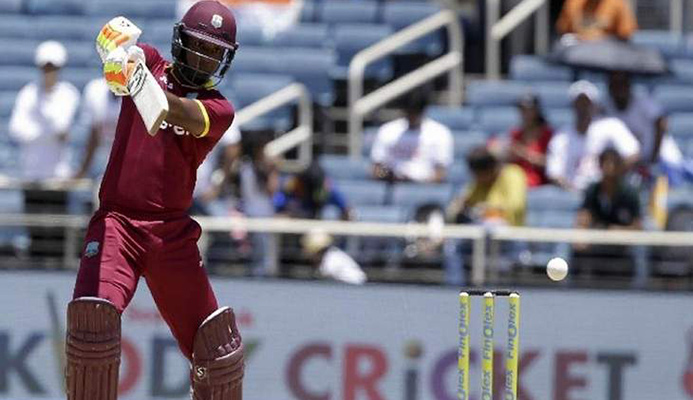If he wasn't on their radar previously, Evin Lewis must certainly be on the minds of a few T20 franchise owners around the world after his blistering match-winning century yesterday at Sabina Park.
And given who the opponents were and the fact that the one-off fixture in Kingston was timed for a primetime Sunday night audience in India, there is every likelihood that a couple Indian Premier League teams will at least be liaising with their Caribbean contacts to explore the possibility of acquiring the services of the 25-year-old left-handed opening batsman from Tableland.
No doubt his mind would have been first and foremost on taking the West Indies past their opponents' challenging total of 190 for six. But in this modern era of professional cricket where the T20 franchise format continues to grow with tournaments springing up all over the place, it would only be natural for any emerging talent in the game anywhere in the world to be mindful that an impressive performance against the right opponents and with the right audience looking on could go a long way towards landing a lucrative contract.
And the numbers from his innings of 125 not out yesterday were certainly very impressive: 12 sixes and six fours off 62 balls; the highest score in a T20 International chase; the first T20 International hundred by a West Indian in the Caribbean; just the third player after Chris Gayle and New Zealand's Brendon McCullum to score more than one T20 International century.
Let us not be so blinded by the big-hitting though to ignore India's missed opportunities in the field to dismiss him. Indeed for a team that prides itself on an impressive level of professionalism it was more than a little surprising to see two near collisions in the outfield – both involving captain Virat Kohli – that contributed to the missed chances while Mahendra Singh Dhoni's usually impeccable work behind the stumps was blotted by an early stumping missed off Gayle while Marlon Samuels also had an escape when victory was a mere formality.
This is the same Evin Lewis of course who just couldn't get going in four innings in the One-Day International series over the previous fortnight. In four innings at the top of the order he totalled a meagre 67 runs (average 16.75) with a highest score of 35.
Is it that he is more comfortable in the game's most abbreviated format? Or maybe it was just his day as he rode his luck all the way to that final winning hit when he swung Ravindra Jadeja for the last of his dozen sixes over backward square-leg? Whatever the reason, he is the talk of the West Indian cricketing scene on the same day that compatriot Anisa Mohammed's three for 39 earned her the “Player of the Match” award as well in the West Indies' 47-run whipping of Sri Lanka at Derby, their first win after four comprehensive defeats at the Women's World Cup in England.
So what is Lewis to do should attractive offers start coming in which clash with West Indies schedules? Should he be expected to forego those financially enriching opportunities because the glory, pride and prestige of playing for the West Indies carry a status far more rewarding than a six-figure salary in US dollars?
Let's be real.
This, essentially, is the dilemma for many top international cricketers, not only West Indians. It's just that the administrators in these parts, now under the banner of Cricket West Indies, appear uniquely unwilling or incapable of reaching an acceptable compromise with these in-demand players that would allow them to play franchise cricket, represent the regional side and still turn out in at least some part of inter-territorial competition, thus ensuring that they are not seen to have ungratefully neglected their own roots.
We have gone over this ground many times before but it is worth reminding ourselves that this T20-era dilemma is nothing new. It resulted in a virtual split in West Indies cricket 40 years ago when Australian television magnate Kerry Packer attracted the best of our players then for two years of World Series Cricket. Even the revered late Sir Frank Worrell refused to tour India in his first year as a West Indies player in 1948/49 because, as someone playing professionally in the Lancashire League in England, he felt he was not being adequately compensated.
Evidently therefore, this issue goes back a very long way. Sadly, the size of the egos and the degree of stubbornness in the Caribbean situation mean we are no closer to reaching an amicable settlement.
Which means that, inevitably, Lewis' explosive innings yesterday will, after the celebration, become a source of contention in the entirely unnecessary tug-of-war between aggravatingly pompous yet deeply insecure prominent personalities in our cricketing domain.

